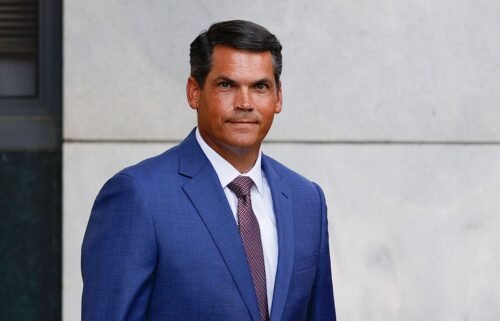Ruth Bader Ginsburg ‘skeptically hopeful’ about preserving Roe v Wade and the court’s future

Supreme Court Justice Ruth Bader Ginsburg believes Roe v. Wade, the 1973 milestone that gave women a constitutional right to abortion, will survive in upcoming years but that the current conservative-dominated court might topple other precedents.
“I would say I’m skeptically hopeful,” she said soon after the July 2018 retirement of Justice Anthony Kennedy, when asked about the overall future of the court without the centrist conservative justice who had provided the crucial fifth vote to uphold abortion rights.
In a new book that recounts some of Ginsburg’s most recent conversations, the 86-year-old justice also expands on her views of the #MeToo movement. She said she heard from women who had complained about the behavior of Hollywood producer Harvey Weinstein and said she hoped judges would not enforce the confidentiality pacts that are often a condition of settlements with victims of sexual wrongdoing.
“I’ve heard from women who told stories about Harvey Weinstein many years ago,” Ginsburg said in a February 2018 interview that received scant notice at the time. “And then, one fine day, the (New York) Times decided to do a big story on it. I think it was the press finally reporting something they knew long before that propelled #MeToo to the place it now holds in the public arena.”
She wondered aloud about settlements in which women were forced, as a condition of settling a lawsuit against any perpetrator, to agree never to disclose anything about the incidents.
“One interesting question is whether we will see an end to the confidentiality pledge. Women who complained and brought suit were offered settlements in which they would agree that they would never disclose what they had complained about. I hope those agreements will not be enforced by courts.”
In a world of seemingly insatiable appetite for anything related to the notoriously iconic Ginsburg comes “Conversations with RBG,” by Jeffrey Rosen, president of the National Constitution Center, longtime law professor, and friend of Ginsburg. The book mixes Ginsburg’s serious reflections on the law with the light observations of a woman still in the game after even four cancer ordeals.
Regarding her ability to concentrate on work, especially over the past year when she cracked her ribs in a fall and then underwent surgery for lung cancer, she said, “Because I realize if I don’t get past unproductive emotions, I’ll just get bogged down and lose precious time from useful work.”
“During that time,” she said of her recovery earlier this year, “the best thing for me was to sit down with an opinion draft, stop thinking about my discomforts, and just do the work.” More recently, this summer, Ginsburg was treated for a recurrence of pancreatic cancer.
Her sense of focus prevails, yet Ginsburg’s humor breaks through in the compiled conversations, especially in tales related to former colleagues. She told Rosen in a July conversation she wanted to correct a report that she had hit Justice Sandra Day O’Connor’s car several times when parking in the Supreme Court garage during their tenure together.
“It’s true I was a very bad driver,” she said, “but scraping Sandra’s car happened only once, not multiple times.”
Ginsburg also recounted, in an earlier interview, how in 1999, as she was undergoing treatment for colorectal cancer, she persuaded reclusive Justice David Souter to accompany her to an opera when her husband Martin was unavailable.
Souter had offered to help Ginsburg’s cancer recovery any way he could, so she called him.
“David, you said anything, anything at all. I don’t want to sit next to an empty seat tomorrow night. Will you join me?” She described her effort to persuade Souter to join her at the Kennedy Center as “a tremendous feat” and noted that “he never came back of his own accord.”
Rosen weaves into the interviews, most of which are from previously reported public appearances, moments from his own life and personal experiences with the justice. Ginsburg helped edit the book’s materials, according to Rosen.
The book offers a reminder of the full life of a jurist who was a pioneering women’s rights advocate before coming to the bench and continued to break ground after her 1993 appointment by Democratic President Bill Clinton.
RELATED: Hillary Clinton admits she played a role in RBG’s selection for Supreme Court
Ginsburg’s health and longevity remain subjects of public interest. She is now the senior liberal on a court composed of four Democrat-appointed liberals and five Republican- appointed conservatives. If she were to feel the need to retire while Republican Donald Trump is in office, her successor would likely swing the bench far to the right and yield a sea change in American law.
The future of abortion rights is already in doubt, with the departure of Kennedy and his replacement by Justice Brett Kavanaugh, who has a more conservative record, including on a woman’s right to end a pregnancy.
“Roe has pretty strong precedential weight by now,” Ginsburg said in an August 2018 interview, explaining why she is hopeful the 1973 case would not be overturned. “In Casey [a 1992 decision that reinforced Roe], the issue was squarely before the Court. The Court said no, we will not overrule Roe. … We have no crystal ball, but a second direct confrontation may be ahead. If so, the odds, I think, are in favor of it not being successful.”
Ginsburg said she hoped Chief Justice John Roberts would decline to vote against such entrenched precedents.
“[G]ood precedent built up over years should survive challenge,” she told Rosen in the August 2018 interview, adding, “And how would the chief justice want his court to be perceived when history is told years later.”
Ginsburg described the Roberts Court as “one of the most activist in history,” based, she said, on instances when it has overturned legislation passed by Congress. Her prime example is the 2013 Shelby County v. Holder decision that pared back the 1965 Voting Rights Act. Ginsburg’s dissent in that case, which went viral, first gave rise the “Notorious RBG” meme.
Rosen’s book closes with Ginsburg’s wary optimism about the future of America’s highest court and her own ability to shape its direction.
“Hope springs eternal,” she said this past July. “I try to be as persuasive as I can in (the justices’ private) conference and in writing opinions. Sometimes I’m successful, sometimes not. But I will continue to try.”



